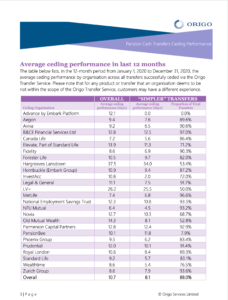The number of ceding pensions transfers carried out within a day increased in 2020, annual figures for Origo’s Transfer Service show.
The Fintech, which handles the vast majority of the industry’s defined contribution pension transfers through the Service, transferred £33 billion for 133 different financial services brands in 2020, with an overall average ceding time across the Service of 11.9 calendar days.
The annual data also showed that 64% of transfers were ceded in under 8 days, and over 52,000, some 7% of the total, were carried out intra-day, up from 5.2% in 2019.
Origo also published its latest Transfer Index (OTI) data – the measure of transfer times of a group of 26 leading pensions and administration companies when ceding DC pensions to another provider –which show overall average pension times amongst this group increased marginally for the year to the end of Q4 2020 (see table below).
Overall, the average time to effect a ceding transfer by this group was 10.7 calendar days, as opposed to 10 days as recorded for the year to the end of Q3 2020, whilst for simpler cases, the average ceding time rose to 8.1 calendar days from 7.6 days.
Commenting on the data, Anthony Rafferty, CEO Origo, says: “While there has been a marginal dip in transfer times this quarter, under a day for both sets of figures, the average transfer time remains firmly under two weeks. It is important to note that transfers through Origo’s Transfer service are measured in calendar days not working days.
“It is encouraging also, to see there has been an increased number of intra-day transfers. This represents nearly £2.3 billion transferred within a single day and reflects best use of technology within the industry.
“A causal effect of the pandemic has been a significant increase in use of technology across financial services, to help maintain and deliver services to clients. With the end of the pandemic, we should see technology and automation of processes in particular, play a far more integral role in many more operations, which can only improve the outcome for the end client and create greater efficiencies and cost savings for providers.”
































